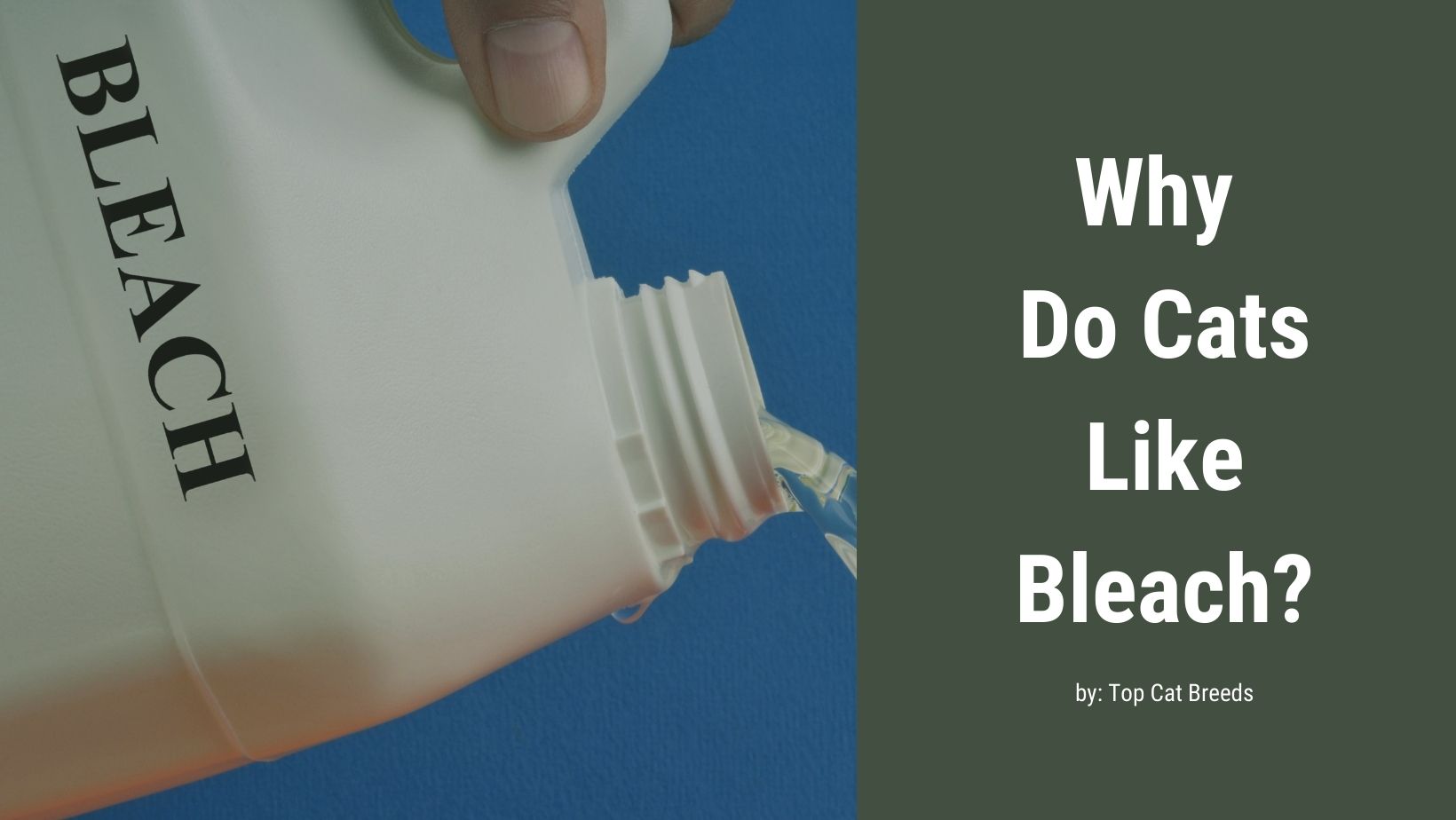
Why do cats like bleach? Sometimes, it’s hard to believe that cats do strange things. For instance, some of these feline activities make no sense. But, in recent years, internet users have noticed that cats are strangely fascinated by bleach.
The scent of chlorine, the main ingredient in household cleaning products, can trigger a cat’s desire to purr and drool. Although it can irritate a pet, it is not harmful unless they ingest it.
There are also reasons why some cats behave strangely, especially when exposed to the smell of bleach. For instance, not all cats will react in the same way to the same chemical.
Are Cats Attracted to Bleach?
Have you ever seen cats going crazy over a certain amount of bleach? This happening leads many people to believe that their pets are mysterious creatures.
For years, scientists have been studying cats to understand their behavior. Through their findings, they could come up with an answer considered impossible.
Scientists have developed a theory about why cats like to drink a lot of bleach. They believe this is due to how sensitive their nose is. So to answer the question, yes, many cats are attracted to bleach.
Why Do Cats Like Bleach Smell?
Cats are prone to reacting unnaturally to chemicals, such as bleach. It can result in them mistaking an unseen guest for a mating cat.
It could be that your cat is experiencing a hormonal response or is enjoying being in a bath full of bleach.
It’s also possible that they’re reacting to drugs that alter their brain function. For instance, medicines can change our attitudes and behavior.
It could also be that the hormones produce an odor similar to an attacker. This happening could signify that the cat is trying to regain its territory.
Although a cat’s reaction may be caused by combining the chemicals in a bath, relying solely on these theories is unnecessary.
Why Is My Cat Obsessed With Bleach?
Contrary to popular belief, cats can also detect things in plain sight. They have evolved to hunt for different needs, which is very different from what humans have been doing.
Your feline has an increased sense of smell and hearing. This ability allows your cats to detect and react to various odors. For instance, the smell of bleach can create different things for your pet.
The rubbing, rolling around, and sniffing of cats is a way for them to show their approval and enjoyment of things. This behavior is also a way to scent-mark things they claim as their own.
Why Do Some Cats Dislike Bleach?
Some cats go crazy, while others do not. Heritable traits are why some cats go crazy and some do not. These are the various characteristics that make up a cat’s personality.
There is also more to the way cats behave than just genetics. For instance, the social aspect of a cat’s behavior can be influenced by its nurture. However, the reaction to chlorine isn’t a learned behavior.
Despite the lack of comprehensive studies on cats, there is still much evidence supporting the idea that certain breeds are more prone to behavioral issues. Both vets and researchers agree that certain breeds are more prone to react differently.
Asian cats are known to exhibit traits that are related to heritable traits. For instance, they tend to show signs of PIKA when they are nursing. Ragdoll cats are also prone to reacting to bleach.
It’s believed that cats inherited their inherited bleach reaction from their parents. One of the most bizarre aspects of genetics is a grab-bag. You can never know what you’ll get from someone who came before you.
Is Bleach Harmful to Cats?
Although it’s not super harmful to cats unless fed deliberately, keeping them away from toxic substances like bleach is still essential. Generally, cats should not come into contact with it.
It’s not harmful to cats to roll around in places where they’ve been using it. However, still, try to discourage them from doing so.
So it’s essential to keep in mind that even if you’re not using concentrated bleaches, they can still be harmful to your cats.
There are also some mild versions of the product designed to be used around the home. However, make sure that they are not getting their hands or tongues.
How to Prevent Bleach Poisoning?
To deter your cat from getting unwell from consuming toxic substances, such as bleach, put them inside a room away from the solution.
It would help if you also dilute your solution to make it less toxic to cats. It will prevent them from getting into it and contaminating it. After you have used the key, put it in a clean and secure container.
Although the toxic substances in the solution are not poisonous to cats, they can still smell them. However, since they can’t drink or lick the answer, they shouldn’t experience poisoning.
What Are the Signs and Symptoms of Bleach Poisoning?
Chlorine poisoning can cause a cat to react unnaturally to the chemicals in its body. Drinking water contaminated with chlorine can also cause your cat to ingest the fumes.
It does not mean that their pets have been poisoned. They usually get a harmless reaction after being exposed to catnip.
Although there are no known poisoning symptoms, you can observe sure signs in cats. Some of these include vomiting, inflamed skin, and a burning sensation in the mouth.
It’s a medical emergency when your cat comes into contact with concentrated, ultra-concentrated, or dilute bleach. If it comes into contact with your cat’s fur or skin, it’s best to immediately get it in the bath.
What Are The Bleach Alternatives to Avoid Harming Your Cat
When it comes to cleaning a catbox, avoid using chlorine. It can cause toxic gas when combined with ammonia. Fortunately, there are different methods to eliminate chlorine without harming your cat.
Sodium bicarbonate is also known as baking soda, which is an abrasive that can remove sticky messes. It’s a great alternative to traditional cleaning products, such as ammonia.
White vinegar is an excellent alternative to harsh chemicals that can harm your cat. You can use it to clean up messes on floors and other surfaces without causing any damage.
Lemon juice is known to remove various stains and hard-to-remove grime. It also makes a great scent.
Castile soap is an excellent alternative to harsh chemicals for pets and kids. It’s safe to use around kids and pets. It’s also a great alternative to traditional cleaning products.
What Should I Do if My Cat Consumes Bleach?
Suppose your pet has been exposed to concentrated bleach or has gotten any chemical in its eyes. In that case, consult a local and trusted veterinarian immediately.
If your pet has been exposed to household or color-safe bleach, it can be treated at home. For mild to moderate skin irritation, apply a few drops of water and a few drops of dog shampoo or mild dishwashing soap to the affected area.
If your cat or dog drank some bleach and did not vomit, it’s essential to encourage them to drink to remove the residual chemicals in their bodies. This method works for both dogs and cats. Also, giving your pets a small bowl of milk can help them drink more effectively.
The symptoms should subside after treating the affected area within about 30 to 45 minutes. However, if they persist, it’s essential to consult a veterinarian. They can then prescribe medication to relieve the discomfort and help the gastrointestinal tract heal.
Read also: Is Acrylic Paint Toxic to Cats?
Frequently Asked Questions
Will Bleach Fumes Hurt My Cat?
Your cat can get injured by inhaling the fumes from a bottle of bleach. It’s essential to keep the container out of reach.
The smell and fumes from cleaning products aren’t the issues; they’re the ones that can do them harm. Having a good sniff from the bottle can trigger respiratory problems.
Long-term exposure to harmful chemicals such as chlorine can cause health issues. It’s also a habit that I should avoid.
Do Cats Get High off Bleach?
Contrary to popular belief, cats do not get high from the fumes of bleach. Some cats do, however, display a similar reaction to catnip.
Although the chemicals in household bleach can cause strange behavior in cats, it’s not clear what is happening. After they can no longer smell the toxic substances, they stop displaying their usual behaviors.
What Is Bleach Doing to Interest Your Cat?
Most people think of sodium hypochlorite as a type of bleach. Still, it has several compounds that can be used to make various chemicals.
When a solution containing sodium hypochlorite decomposes, it releases chlorine. It can be that your cat likes it or that it’s just a waste of chlorine.
Exposure to various organic compounds releases volatile organic compounds, known as VOCs. Some of these include chloroform and carbon tetrachloride.
Why Are Cats Addicted to Cleaning Agents Like Bleach?
If you are a feline lover, you’ve probably run into the strange phenomenon of cats going crazy over some bleach before. One of those bizarre kitty demeanors makes us assume that our furry friends are weird animals that we cannot anticipate to comprehend. However, most cat demeanors make more sense than expected.
For many years scientists and behavior experts have put their efforts into decoding the hows and whys of cat behavior. Many studies about their biology and what makes cats tick have come up with answers that we once considered impossible. After all, science is incredible stuff that can help us understand almost anything.
Even if there’s no confirmed explanation, scientists have put their reasons to the query of why felines like bleach. The hypothesis they’ve arrived at has to do with how sensitive a kitty’s nose is.
Final Thoughts
In the world of strange cat behavior, the reaction to a specific type of chemical known as bleach is regarded as one of the most intense things that a cat can do.
You should avoid exposing your cat to harmful chemicals but avoid using bleach as a pet care product. It is because it is toxic and detrimental. When people ask about the strange behavior of their cats, they usually end up with an unexpected answer. The response is usually to separate them.

